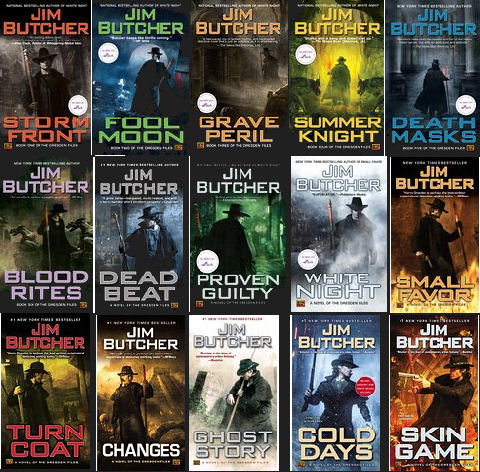
The brunt of my reading over the last many weeks since my last post (and it actually started before that last post) was binge reading through Jim Butcher’s Dresden Files (April 1, 2000 – May 27, 2014) novels.

It’s going to seem short shrift to place them all into one small review, but I’m not going to go through and review each individual one of the fifteen. I found them to be fun, irreverent, easy reads, the basic premise, the exploits of an openly proclaimed wizard in Chicago, as he fights demons, ghouls, and more, alongside the local police department’s division for handling stuff that no one can explain, no one wants to handle, and no one wants to talk about. Harry Dresden is a wisecracking magically endowed private investigator who loves nothing more than bringing in cult movie and television references, more or less just to see if anyone around him is paying attention. I found the series to get a bit off the rails in books 13 and 14, where it seemed like Butcher was taking it in a totally new direction, and the writing seemed a bit lost, but it all came back on track in the current last novel. Overall, a great series to get started on if you like the world of magic, the paranormal, crime, and punishment! The series was turned into a not short-lived enough, and truly, appallingly, bad television show that shouldn’t have lasted through the first season that it did. ☆☆☆☆
Several years ago someone recommended Robert Harris’ historical novel Imperium: A Novel of Ancient Rome (September 19, 2006) to me. Given my love of things Italian, history, and fiction, it was a match made in heaven. It’s basically a fictional account of the life of Marcus Cicero, the famed orator of the Roman senate, as he first came to power. The book is written as an eyewitness account from his personal slave and secretary, Tiro. Historical fiction is a favorite genre of mine, and this was completely engaging, and more or less a “couldn’t put it down” kind of read. My recollection is I read through it in a matter of a couple of days. And, obviously, I loved it. As to why I didn’t jump right into the next book in the series, I truly can’t tell you. But, it suddenly occurred to me that I hadn’t, and I rectified that with a plunge into Conspirata: A Novel of Ancient Rome (March 30, 2010) right after finishing the Dresden Files. Equally as good, the story continues with Cicero’s political career as he encounters some of the best known figures of that time, including Julius Caesar. Political machinations are the core of the second novel, and it’s surprising in many ways how little the world of political intrigue has changed in the millenia since (then again, the novels are written by someone living in today’s world, so it may be that Harris simply borrows from that which is familiar to a modern audience). In the world of “court politics” or “palace intrigue” this easily rivals the intricacy of well known pop culture references like Game of Thrones, House of Cards, or Scandal. Looking forward to the next novel! ☆☆☆☆
Neal Stephenson, Seveneves, (May 19, 2015)
One of the things that’s count-on-able with Stephenson’s longer novels is that they follow a predictable pattern. If you assume roughly 900 pages or thereabouts for most of them, there will be an initiating event, something that starts the entire story in motion, something to grab your attention, and it will take up the first 150-200 pages. Then there will be roughly 400-500 pages of character development, lots of explication, lots of looking at how motivations develop, lots of “here, let me explain why the story, when we get to it, is going to go the way it goes”. And then it’s finished off with what amounts to the “real” novel, about 250-300 pages where all the action that was set in motion, and influenced by all the motivations developed during the entire middle section, happens. I hear time and again how people launched into one of his books with fascination at the premise, and then gave up 100 or so pages further on when it just got too tedious to continue. And they miss out on all the good part when the story takes off again.
This book is no different. I read through section 1 in under two hours, a complete page turner. Then it took me a month to get through to “section 3” (pages 567-861), because I found I couldn’t read more than a few pages of section 2 (pages 227-567) at a time without drifting off. And then I read through section 3 without pausing in roughly two hours.
Loved sections one and three. I appreciate the info in section two, but my god there’s got to be a way to do that midsection of all of his books in half or fewer of the pages. ☆☆☆☆
Lucy Burdette, Killer Takeout, (April 5, 2016)
Last year I whizzed my way through the six novels of the “Key West Food Critic Mysteries”. Basically, I’d refer you to that review, particularly the last couple of paragraphs where I summed up the series. Much the same holds true for this seventh novel, a fun read, but showing a decided lack of knowledge in the food world.
Although I’ve liked this series a fair amount, something about this latest volume just felt a little thrown together, as if it wasn’t thought through as well as the others, and that’s saying something given my thoughts about the series. I still enjoyed it, just not as much as the rest.
I hadn’t done any research into the author, and “Lucy Burdette” turns out to be a pen-name for Roberta Isleib, a clinical psychologist, also known for writing a series of golf-mystery novels, and who writes an advice column under the title “Ask Dr. Aster”. A psychologist with three different identities… just something to muse upon.
